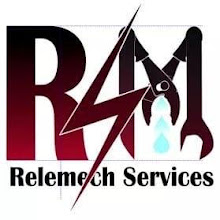Did you know that an estimated 24,000 people are killed by lightning strikes around the world each year and about 240,000 are injured? Knowing how to protect yourself and your property could be the difference between Life and Death. Before we discuss on the different Lightning Protection systems, we share with you simple but effective ways to protect yourself from lighting
 |
| A Lightning Strike |
Perhaps the most basic definition of Lightning: the occurrence of a natural electrical discharge of very short duration and high voltage between a cloud and the ground or within a cloud, accompanied by a bright flash and typically also thunder.Lightning is an electric current. Within a thundercloud way up in the sky, many small bits of ice (frozen raindrops) bump into each other as they move around in the air.
All of those collisions create an electric charge. After a while, the whole cloud fills up with electrical charges. The positive charges or protons form at the top of the cloud and the negative charges or electrons form at the bottom of the cloud. Since opposites attract, that causes a positive charge to build up on the ground beneath the cloud. The grounds electrical charge concentrates around anything that sticks up, such as mountains, people, or single trees. The charge coming up from these points eventually connects with a charge reaching down from the clouds and - zap - lightning strikes!
How Do you Protect yourself from lightning?
In general, it seems quite easy to shelter from the rain under the eaves of a house. And many people believe that they will be safe inside a building. However, when lightning (electrical current) flows through an object, most of the current flows along the surface, with only a little through the center, in what is known as a skin effect. This means that eaves and the sides of pillars can be dangerous.
Here are basic but effective ways to protect yourself from lightning?
2. Avoid using your corded landline telephone during lightning storms. If lightning strikes the main phone line in your neighborhood or outside your home, the electricity from the strike will travel through every phone connected to the line, and electrocute anyone using the telephone.
3.Don't use appliances that are plugged into the wall during lightning storms. Appliances that are plugged into the wall and turned on can be dangerous for you to use if lightening strikes your home or the power line it is connected to.Turn off televisions, computers, air conditioners, and other appliances that are plugged in and running during lightning storms.
4.Avoid standing on surfaces in which moisture or water is present during lightning storms. Electrical currents will travel through the ground where water is present, and can electrocute anyone in contact with these surfaces. Examples of surfaces to avoid are basement floors, patios, garage flooring, and other flooring where water and other moisture may be present.
5. Do not lean on or sit against walls during lightning storms. Sometimes lightning can reach the electrical wiring in walls, which can cause you to become shocked or electrocuted if you are pressed against a wall.
7. Very basic but perhaps most important: If you're outside keep an eye on the weather. Look for darkening skies, flashes of lightning, or increasing winds. Lightning often precedes rain, so don't wait for rain to fall. And if you hear thunder, go inside immediately.Prevention is Better Than Cure, remember that old saying?
In the spirit of prevention in our next article, we will discuss Lightning protection systems that can be installed on your property to protect yourself and your loved ones from this Beautiful yet deady natural phenomena.













